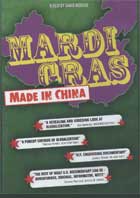
Mardi Gras: Made in China 2006
Distributed by Carnivalesque Films, 260 Washington Avenue #5C, Brooklyn, NY 11205; 203-417-3136 or 347-282-6132
Produced by David Redmon
Directed by David Redmon
DVD, color, 73 min.
Sr. High - Adult
Globalization, Economics, Economic Development, Capital Markets
Date Entered: 07/13/2007
Reviewed by Susan Awe, Parish Memorial Library for Business & Economics, University of New Mexico, Albuquerque, NMThese two documentaries highlight the inequities and dark side of globalization and expose the juxtaposition of American or Western cultures’ excesses and consumer ignorance of the conditions under which these goods are produced. Both films will help viewers understand globalization and how it affects workers in India’s textile industry and Chinese factory workers. While retailers and manufacturers often won’t talk to the filmmakers, the factory workers, doctors, and scientists testify eloquently to the human misery, suffering, disease, and even death caused by the production of cheap consumer goods. The environmental damage and costs of the pesticides and chemicals will continue to affect the exploited workers and their polluted homelands for many years. The combination of filming in the U.S. at Mardi Gras by David Redmon and then in rural China at the Tai Kuen Bead Factory clearly illuminates the vast discrepancies in the two cultures and results in a very powerful, educational video on human rights and corporate greed. Heinemann’s Killer Bargain, filmed mainly in northern India, shows why consumers must hold companies accountable for the conditions under which their products are produced. The film also points out that some Indian textile suppliers use environmentally friendly techniques but because their products cost marginally more, many western retailers purchase the cheaper goods over their products. Concepts illustrated by these two films include the causes of poverty and underdevelopment, the economic questions surrounding predatory management practices and fair wages, and the environmental impact of unrestricted development.
Video techniques and effects are well executed. Editing of the scenes from the cotton farms, the factories, and the hospitals is judicious and effective. The subtitles are large and clear did not interfere with the films. These DVDs are suitable for adults of all ages. Academic and public libraries will want to purchase to show viewers the victims of the global market today, the poverty experienced in developing countries, and the working conditions on farms and in factories.
Awards for Mardi Gras
- Grand Jury Prize Best Documentary at the Florida, Magnolia, Mass Art, Camden International Film Festivals
- Best Global Consciousness Documentary Mountain Telluride Film Festival
- Nominated for Grand Jury Prize Sundance Film Festival